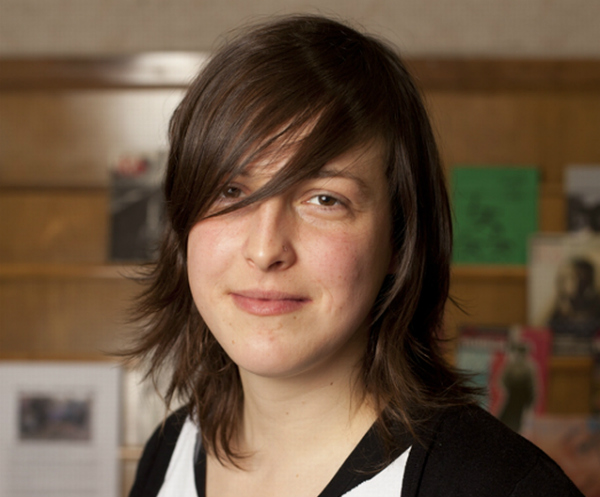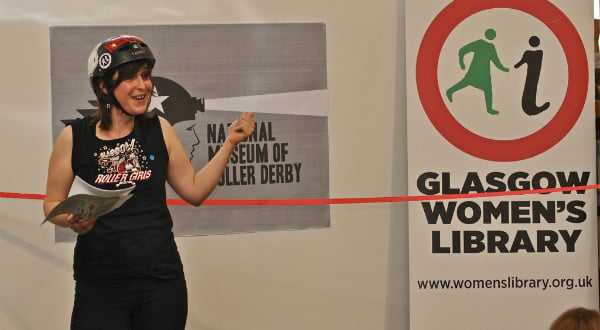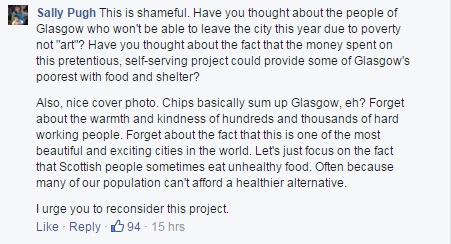Art World
Artist’s $22,000 Grant to ‘Stay in Glasgow’ Sparks Ugly Social Media Backlash
Her project has been called pretentious and self-serving.

Photo: via Glasgow Women's Library.
Her project has been called pretentious and self-serving.

Lorena Muñoz-Alonso

The artist Ellie Harrison has been given a £15,000 ($22,000) grant by the organization Creative Scotland to fund her project The Glasgow Effect, an “action research project/durational performance” which consists of the artist not leaving the city for a whole year.
The purpose, according to the artist’s blog, is to “test the limits of a ‘sustainable practice’ and to challenge the demand-to-travel placed upon the ‘successful’ artist/academic.” The experiment, she argues, will enable her to “cut her carbon footprint and increase her sense of belonging, by encouraging her to seek out and create ‘local opportunities’.”

The artist Ellie Harrison.
Photo: via Glasgow Women’s Library.
Despite its emphasis on local community, however, The Glasgow Effect hasn’t got off to a great start with some Glaswegians who resent the use of public funds to support the project while there are other social or artistic projects which are, in their view, much more deserving.
Shortly after the project was launched publicly on January 1, many locals took to social media to express their outrage, and even issued a petition to the government to stop the project.
Some also took issue with the artist’s choice of cover image for the project’s Facebook page, which features fries. “Chips basically sum up Glasgow, eh?” read an angry comment:

Unfortunately, on top of the string of critical and disapproving yet civilized posts, a slew of insulting and abusive comments has taken over the page’s feed, a harsh testimony of the extremely poor reception that the project has had within the local community.

Another commenter felt less aggravated by the artist herself than by the funding body, writing on Facebook: “I’m more disgusted at Creative Scotland for funding this and by doing so showing their contempt for Glasgow, its talent and its people.”
“Ellie Harrison is a recognized artist with an MA with Distinction from the Glasgow School of Art,” a Creative Scotland spokesperson told artnet News via email on Tuesday morning, defending Harrison and her project in light of the backlash.
“Ellie’s project met the criteria for Open Project Funding and is based on the premise that if society wishes to achieve global change then individuals have to be more active within their communities at a local level,” they explained.
“In restricting herself to staying within the city boundaries she is keen to explore what impact this will have on her life and on her work as an artist with national and international commitments. Our funding will support Ellie’s creative practice in the city and we will be interested to see how the project progresses,” the spokesperson added.
Meanwhile, the controversy had also taken Twitter by storm:
.@CreativeScots for an organisation who fails to recognise Comedy as an Art Form, your fair having a laugh with #GlasgowEffect
— Scott Gibson (@BigScottGibson) January 4, 2016
I've just been awarded a £40,000 grant from Creative Scotland to eat nothing but Tunnock's Tea Cakes for a year.
— Brian Spanner (@BrianSpanner1) January 4, 2016
Harrison, whose work is currently on view at the exhibition “Big Bang Data” at London’s Somerset House, was born in London in 1979, but has been based in Glasgow since 2008, where she received her MFA at the prestigious Glasgow School of Arts in 2010. Besides her art practice, the artist is also a Fine Art lecturer at the Duncan of Jordanstone College of Art & Design in Dundee, Scotland.
Harrison, who defines herself as an “artist and activist,” works across a wide range of media, including installation, performance, internet and broadcasting-based works, writing, lecturing. Her political activism included an appearance at the Scottish Parliament to defend the ‘Say No to Tesco’ petition—aimed at giving local councils the power to stop the unwanted expansion of the supermarket chain on their local high streets—and campaigning to get money from pension funds invested ethically.
It seems that her latest socially engaged project has backfired spectacularly, however, alienating the very community she’s trying to foster. artnet News contacted the artist to gauge her views on The Glasgow Effect and the controversy that has ensued, but she hadn’t replied to our request for comment at the time of publishing.